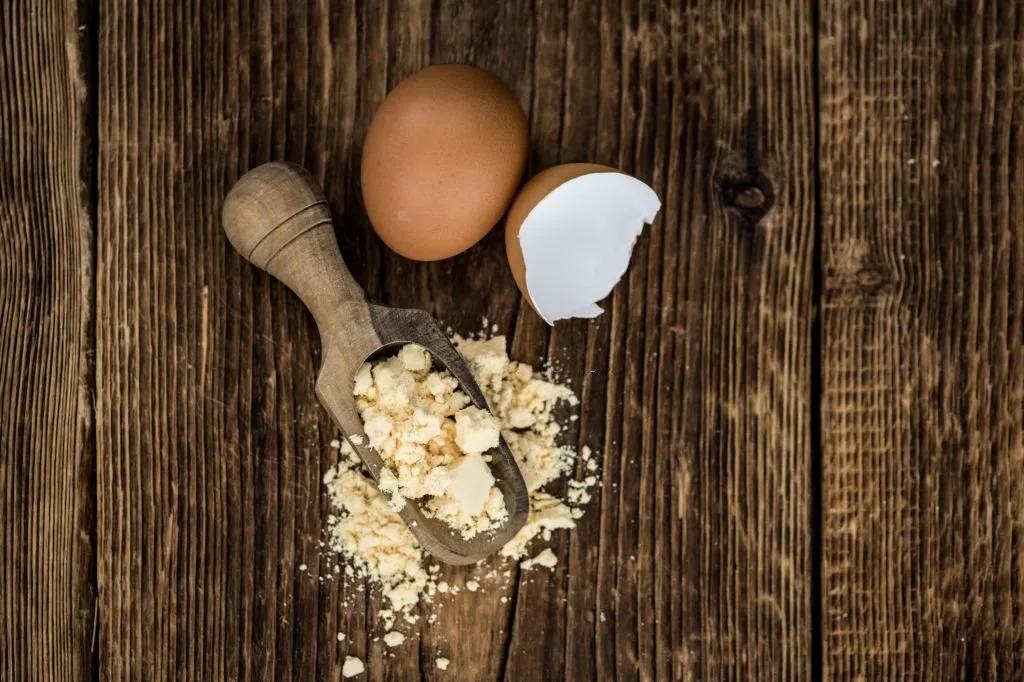We often picture creatine as powdered powerhouse athletes take and food like red meats or fish. But what about this one of our kitchen’s simplest and most universal foods – the humble egg? Is there creatine in eggs; is it sufficient for your optimum goal?
Eggs contain a small amount of creatine, approximately 0.1 to 0.3 grams per yolk. But cooking or boiling them may decrease the creatine content. Though the creatine content in eggs is relatively low compared to other sources like meat and fish, they are still a healthy source of nutrition.
Let’s discuss all the aspects of eggs, their creatine content, and the best recipes to retain the max after cooking.
How Much Creatine In Eggs?
Eggs contain creatine, but in a tiny amount, mostly in yolk. They have around 0.1 to 0.5 grams of creatine per 100 grams of egg yolk. If you eat about 60 eggs, you will get 5 g of creatine – the recommended dosage for fitness.
How Much Creatine In Egg White?
There isn’t enough data to know the exact amount of creatine in egg whites, but it’s likely to be very little or non-existent. Egg yolk has more creatine, a nutrient linked to muscle energy storage, than egg white.
The egg white, also known as the albumen, consists mainly of water and protein, with little to no fat and few other nutrients. So, egg whites are highly unlikely to contain much creatine, as it is typically found with fat and other complex compounds.
Here’s a simplified breakdown of creatine content in eggs.
| Egg Component | Creatine Content per 100g |
| Egg Yolk | 0.1 – 0.5 grams |
| Egg White | Negligible |
Creatine Content in Different Types of Eggs
When it comes to creatine content, though, not all eggs are created equal. Let’s explore the differences between various types of eggs:
| Type of Egg | Creatine Content (per 100g) |
| Chicken Eggs | 0.1 |
| Duck Eggs | 0.15 |
| Quail Eggs | 0.1 |
| Ostrich Egg | 0.1 – 0.3 |
Creatine in Eggs vs. Other Sources
While eggs contain creatine, their content is relatively low than other natural sources. First, let’s check what creatine content other sources offer you.
| Source | Creatine Content (g) per 100g |
| Herring | 1.1 |
| Red Meat | 0.7 – 1.0 |
| Fish (especially salmon and tuna) | 0.9 |
| Poultry | 0.6 – 0.8 |
| Lamb | 0.5 |
| Eggs | 0.1 – 0.3 |
| Creatine Supplement | Varies by product |
So, where does this chart lead us about eggs vs. other creatine sources?
Well, the amount of creatine found in animal sources can differ. Fish and red meat have the highest amounts, followed by pork and poultry. On the other hand, eggs have the lowest amount of creatine among animal sources.

Should You Rely on Eggs for Creatine?
If you rely solely on eggs for creatine, they may not be the best natural source for their low creatine content. Beef, pork, chicken, and fish such as herring, salmon, tuna, cod, and shrimp are some best natural sources of creatine. They come from the skeletal muscle, where most of the creatine is stored.
These foods can provide 1-2 g of creatine daily – yes – your steak too. It is the amount that some experts recommend for a natural diet.
However, if you want to increase your creatine intake beyond that, consider taking a supplement.
Check out what foods are high in creatine.
Creatine in Eggs vs. Synthetic Supplements
Creatine in eggs and synthetic supplements serves different purposes and appeals to different needs. Eggs offer a natural and nutritious source of creatine but in much smaller quantities than supplements.
On the other hand, creatine supplements provide a concentrated and readily absorbable form, ideal for those targeting specific fitness goals.
Bioavailability and Absorption
Creatine from eggs can be a viable alternative to synthetic supplements. While supplements provide a concentrated source, the natural creatine in eggs may offer better bioavailability and absorption.
Studies have shown that combining creatine with certain nutrients can enhance absorption. Eggs, with their balanced nutritional profile, may be an ideal source. But you may have to consume many eggs to match the creatine levels in supplements.
Safety Considerations
Safety is often a concern with synthetic supplements. Creatine from natural food sources like eggs avoids the potential impurities or additives in commercial supplements.
Creatine in Eggs: Benefits and Limitations
In a world where protein-packed meals are key to muscle growth, creatine in eggs opens new doors. But what are the benefits and limitations of relying on eggs for creatine intake?
Benefits
- Economical Choice: Eggs can be a budget-friendly option compared to meat and fish, making them a great source of nutrition that won’t break the bank.
- Versatility: You can use eggs in various dishes, from omelets to baked goods.
- Dietary Inclusion: For those vegetarians who enjoy eggs, it’s a great way to add even more nutrients. Have you ever thought if creatine is vegan-friendly?
Limitations
- Lower Creatine Content: Compared to traditional sources, eggs contain a lesser amount of creatine.
- Not a Replacement: Eggs alone may not suffice for those looking to meet higher creatine needs.
How Cooking Methods Affect Creatine In Eggs?
Cooking can impact the creatine content in eggs. Research suggests that gentle cooking techniques such as soft boiling and poaching may be the best options, as they help to retain the creatine content more effectively. High heat and longer cooking times may lead to some creatine loss.
So, to get the most creatine from your diet, assess how you cook your eggs.
Let’s check how cooking methods affect creatine content in eggs.
| Cooking Method | Creatine Impact |
| Boiling | Minimal to a slight loss |
| Scrambling | Varies with heat |
| Frying | Limited to substantial loss |
| Poaching | Minimal loss |
Cooking Techniques to Maximize Creatine
Here are some helpful egg-cellent tips for retaining creatine in eggs.
- Consider gentle cooking methods like boiling or poaching.
- Avoid overcooking, as high temperatures may reduce creatine content.
- Try incorporating eggs into dishes that combine other creatine-rich foods, such as meats or fish, to boost the overall creatine profile of the meal.
Delicious Recipes with Creatine-Rich Eggs
- Creatine Boost Breakfast Scramble: Combine scrambled eggs with spinach, tomatoes, and lean meat for a balanced and creatine-rich breakfast.
- Poached Egg Salad: Gently poached eggs atop a salad of mixed greens, quinoa, and grilled chicken create a nourishing lunch or dinner option.
- Egg & Seafood Stir-Fry: Stir-fry eggs with shrimp, broccoli, and brown rice for a delightful creatine-enhanced meal.

Egg Nutrition: Beyond Creatine
While eggs may not be a significant source of creatine, they are high in nutritional value. Here’s the nutritional value chart for a large egg (50 grams).
| Nutrient | Amount | % Daily Value |
| Calories | 72 | |
| Total Fat | 4.8g | 6% |
| Cholesterol | 186mg | 62% |
| Sodium | 71mg | 3% |
| Total Carbohydrates | 0.4g | 0% |
| Protein | 6.3g | 12% |
| Vitamin D | 1mcg | 5% |
| Calcium | 28mg | 2% |
| Iron | 0.9mg | 5% |
| Potassium | 69mg | 1% |
Eggs are rich in high-quality protein, supporting muscle growth and repair. But besides that, they provide essential vitamins like Vitamin B12, Vitamin D, and riboflavin and contain minerals like selenium, zinc, and iron that support overall health.
Although eggs contain cholesterol, recent research has shown that dietary cholesterol has a minimal effect on blood cholesterol in most people.
Conclusion
Creatine in eggs is an intriguing subject, but the truth is eggs are not a significant source of this essential nutrient. While they contain some creatine, the amount is minimal compared to other sources like red meat, fish, and poultry.
So, to increase creatine intake, look beyond eggs and explore various dietary and supplementation options.
Check out more insights on safe supplementation in our blogs.

I am a health and wellness enthusiast working in a Pittsburgh-based wellness clinic. My primary role as a consultant is to tailor a balanced lifestyle for my patients, where positive steps and potent supplements play a synergistic role.

